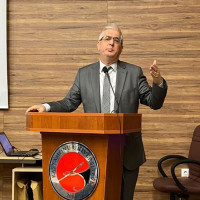Research Article
Issue Reviewers

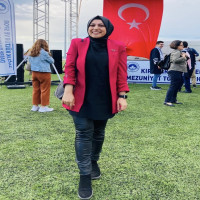

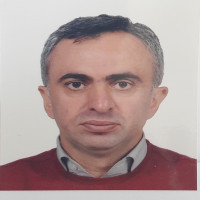
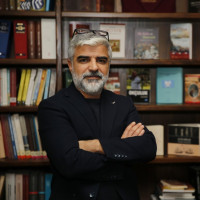
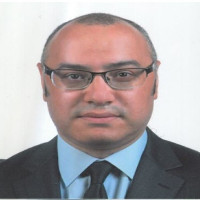





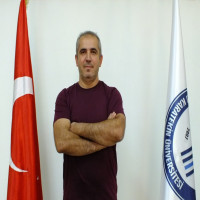



Askerî Tarih, Gayrinizami Harp Tarihi, İstihbarat Tarihi, Teşkilat-ı Mahsusa, İttihat ve Terakki, Kolluk Tarihi (Jandarma), Eşkıyalık, Millî Mücadele ve Atatürk Dönemi Türkiye, Göçler ve Salgınlar


Yaşar ÖZÜÇETİN
1967 yılında Konya’da doğdu. 1987 yılında Gazi Üniversitesi Gazi Eğitim Fakültesi Sosyal Bilgiler Eğitimi Bölümü Tarih Anabilim Dalından mezun oldu. 1994 yılında Gazi Üniversitesi, Sosyal Bilimler Enstitüsünde “20. Yüzyıl Başlarında Türkçülük Hareketi (1910-1923)” üzerine yaptığı tez ile yüksek lisansını, aynı enstitüde “Mehmet Şemsettin Günaltay’ın Hayatı, İlmî, idarî, Siyasî Faaliyetleri” adlı çalışması ile doktorasını tamamladı. Milli Eğitim Banklığında öğretmen ve idareci olarak görevlerde bulundu. 1998 yılında KTÜ Giresun Eğitim Fakültesinde, 2000 yılında KTÜ Giresun Fen Edebiyat Fakültesinde, 2002 yılında GÜ Kırşehir Eğitim Fakültesinde, 2003 yılından itibaren de GÜ Kırşehir Fen Edebiyat Fakültesi Tarih Bölümünde öğretim üyesi olarak görev yaptı. 2010 yılında Atatürk İnkılapları ve Türkiye Cumhuriyeti Tarihi Bilim Alanında doçent, 2015 yılında da profesör oldu. Çeşitli ulusal ve uluslar arası dergilerde makaleleri yayımlandı. Kitapları; Çok Partili Hayata Geçiş Sürecinde Kırşehir, Berikan Yayınevi, Ankara (2009), Ahi Evran Üniversitesi Kırşehir Eğitim Fakültesi Dergisi (KEFAD) Dizini, (Cilt 1-9), http://kefad.ahievran.edu.tr (16.11.2009), Kuva-yı Milliye ve Milli Mücadelede Kırşehir, Yayın No: 33, Kırşehir (2009), (Editör), KIRŞEHİR (Siyasî Tarihi ve Kırşehir Tarihî Bibliyografyası), ISBN:978-605-149-514-9 Kırşehir Valiliği İl Kültür ve Turizm Müdürlüğü, Gökçe Ofset Matbaacılık, Ankara /2014), Kurtuluş ve Kuruluşta Milletvekili Gözüyle Gazi Mustafa Kemal Paşa (1920-1923), ISBN: 978-605-9912-41-9, Berikan Yayınevi, Ankara (2015), (İkinci baskı 2020). Kırşehir Ahi Evran Üniversitesi Fen Edebiyat Fakültesi Tarih Bölümü Başkanlığı (2010-2018), Kırşehir Ahi Evran Üniversitesi Sosyal Bilimler Enstitüsü Müdürlüğü görevini yürüten Prof. Dr Yaşar Özüçetin’in yabancı dili Fransızca olup, evli ve iki çocuk babasıdır.





Lisans, Dokuz Eylül Üniversitesi, Tarih Bölümü, 2014
Yüksek Lisans, Marmara Üniversitesi Türkiyat Araştırmaları Enstitüsü, 2016
Doktora, Eskişehir Osmangazi Üniversitesi, Sosyal Bilimler Enstitüsü, 2021
Mesleki deneyim: 2014-2015 Marmara Üniversitesi, Türkiyat Araştırmaları Enstitüsü, Araştırma Görevlisi
2015-2023 Eskişehir Osmangazi Üniversitesi, Tarih Bölümü, Araştırma Görevlisi
2023-Halen Eskişehir Osmangazi Üniversitesi, Tarih Bölümü, Dr. Öğr. Üyesi

Aim & Scope
The aim of The Journal of Modern Turkish History Studies is to include scientific studies that deal with all aspects of the political, social, cultural and economic developments from the Ottoman modernization period to the Republic of Turkey, taking into account the characteristics of the period. It is to deal with what happened in this time period in a discussion ground and to share the work done with the public. The Journal of Modern Turkish History Studies will include articles from many different disciplines with a critical approach, in line with its purpose.
Recent Ottoman History and Republican Period Turkish History are the research subjects of The Journal of Modern Turkish History Studies. Articles in The Journal of Modern Turkish History Studies are published in Turkish, English, French and German.
Author Guidelines
Our journal publishes original research and review articles, translation, archival documents, book reviews and promotions, obituaries, symposium news, etc. The editor may make changes to the writing and language of the articles when necessary. The authors are responsible for the content of the articles.
ARTICLE WRITING GUIDELINES
Works submitted to our journal should be prepared according to “The Chicago Manual of Style (17th Edition, Notes and Bibliography)” citation and reference system.
The format of the article should be as specified below:
FORMAT:
Program: Microsoft Word
Paper Size: 210x297 mm
MARGINS:
Top: 2.5 cm
Bottom: 2.5 cm
Right: 2.5 cm
Left: 4 cm
TITLE / SUBTITLE:
Top: 2 cm
Bottom: 2 cm
TEXT:
Font: Times New Roman, 12 point
Paragraph Indentation: 1.25 cm
Paragraph Spacing: Before 0.6 nk
Line Spacing: Single
Text Quotes: Italics
FOOTNOTES:
Font: Times New Roman, 9 point
Line Spacing: Single
Hanging Indent: 0
The article can be written in Turkish or English. An abstract not exceeding 200 words, in both Turkish and English, should be included.
At the end of the article, a minimum of 750-1200 words of English Extended Abstract should be included.
Up to seven relevant keywords in Turkish and English describing the topic must be provided.
The author must indicate their academic title, the institution they work for, and their email address (in parentheses and italicized) along with their ORCID number by placing a corresponding footnote in the section of their name and surname found on the first page of the article.
Example:
Prof. Dr., Dokuz Eylul University, Atatürk Principles and History of Revolution Institute, (abc@deu.edu.tr), (ORCID: 0001-0000-0000-000X).
The main headings relevant to the topic in the article should be numbered as 1, 2, 3, etc., while subheadings should be numbered as 1.1, 2.1, 3.1, etc.
Maps or images intended to be added to the article should be included in the Word (.doc, .docx) document, and numbered separately, and should also be sent separately from the article.
Graphs should be prepared in Microsoft Office Excel (.xls) or Word (.doc, .docx) documents and should be incorporated into the document appropriately.
Citing Footnotes
Our journal uses the latest version of the Chicago footnote and bibliography style.
When citing a source for the first time, the author's full name should be written.
The title of the source work should be written in italics.
The publisher, place of publication, year, and page number of the source work should be provided.
Footnotes should be presented in Times New Roman font size 9.
Shortened Footnotes (for citations following the first reference)
Subsequent citations of the same source after the first reference are presented in a shortened form in the footnote. The abbreviation should remind the reader of the full title or direct them to the appropriate entry in the bibliography. The form of the abbreviation may vary depending on whether there are other sources interjected:
Example:
1 Şerafettin Turan, Mustafa Kemal Atatürk, (Ankara: Bilgi Yayınevi, 2004), 123. (Footnote presentation of the first citation.)
2 Turan, Mustafa Kemal Atatürk, 132.
3 Turan, 225.
4 Şevket Süreyya Aydemir, Suyu Arayan Adam (Istanbul: Remzi Kitabevi, 2024), 27.
5 Turan, Mustafa Kemal Atatürk, 152.
Italics and Quotation Marks
Whether in the text or the bibliography, books, journals, plays, and other singular sources (standalone sources) are written in italics. An article, book chapter, or section within a novel is shown in quotation marks.
Example:
In class, we read A Separate Peace (book title). The article titled “Your Brain on Drugs” in Time magazine was very impressive.
The expression “in the magazine” has not been italicized because it is not part of the publication's title.
His article titled “Death by Dessert” was published in The New York Times Magazine.
In this example, both “The” and “Magazine” are italicized because they are parts of the publication's name.
Block Quotes
Quotations exceeding 100 words are written as block quotes. Even if the quotation does not exceed 100 words, block quote format is applied when quoting two or more paragraphs.
Also, information presented in list format or text that has a specific arrangement, such as poetry, should also be shown as a block quote. Quotation marks are not used in block quotes. A block quote always starts on a new line. A blank line should be left before and after the block quote. The entire block should be indented 1.5 cm from both the left and right sides. The text of a block quote must be single-spaced and in 11 point font. Since the text of the block quote is distinct from the main text due to formatting, it does not need to be italicized.
Single-Authored Book
Footnote
1 Şerafettin Turan, Mustafa Kemal Atatürk, (Ankara: Bilgi Yayınevi, 2004), 123.
Bibliography
Turan, Şerafettin. Mustafa Kemal Atatürk. Ankara: Bilgi Yayınevi, 2004.
Two or Three-Authored Book
Footnote
1 Selim İlkin and İlhan Tekeli, İkinci Dünya Savaşı Türkiyesi (Istanbul: İletişim Yayınları, 2005), 324.
Bibliography
İlkin, Selim, and Tekeli, İlhan. İkinci Dünya Savaşı Türkiyesi. Istanbul: İletişim Yayınları, 2005.
Editor Instead of Author
Footnote
1 Baskın Oran, ed., Türk Dış Politikası (Istanbul: İletişim Yayınları, 2020), 252.
Bibliography
Oran, Baskın, ed. Türk Dış Politikası. Istanbul: İletişim Yayınları, 2020.
Translated Book
Footnote
1 Edward J. Erickson, Size Ölmeyi Emrediyorum!, trans. Tanju Akad, 4th ed. (Istanbul: Kitap Yayınevi, 2017), 25.
Bibliography
Erickson, Edward J. Size Ölmeyi Emrediyorum!, translated by Tanju Akad, 4th ed. Istanbul: Kitap Yayınevi, 2017.
Multi-Volume Book
Footnote
1 Şerafettin Turan, Türk Devrim Tarihi, vol. 3, 4th ed. (Ankara: Bilgi Yayınevi, 2018), 35.
Bibliography
Turan, Şerafettin. Türk Devrim Tarihi, vol. 3, 4th ed. Ankara: Bilgi, 2018.
Book Chapter
Footnote
1 Abdurrahman Çaycı, “Atatürk’ün Uygarlık Anlayışı” in Atatürk Konferansları -IV (1973-1974) (Ankara: Türk Tarih Kurumu, 1977), 117.
Bibliography
Çaycı, Abdurrahman. “Atatürk’ün Uygarlık Anlayışı.” In Atatürk Konferansları -IV (1973-1974), 117-129. Ankara: Türk Tarih Kurumu, 1977.
Chapter in an Edited Book
Footnote
Fevzi Çakmak, “Kemalist Milliyetçiliğin İdeoloğu: Recep Peker,” in Tek Parti Döneminde Türk Milliyetçiliğinin Farklılaşan ‘Yüz’leri (1923-1950), ed. Rukiye Saygılı (Ankara: Orion Kitabevi, 2022), 271.
Bibliography
Çakmak, Fevzi. “Kemalist Milliyetçiliğin İdeoloğu: Recep Peker.” In Tek Parti Döneminde Türk Milliyetçiliğinin Farklılaşan ‘Yüz’leri (1923-1950), edited by Rukiye Saygılı, 271-285. Ankara: Orion Kitabevi, 2022.
Article
Author's Full Name, “Article Title,” Journal Name vol. no, no. no (Publication Year): page, DOI or URL.
Footnote
1 Zeki Arıkan, “Mahmut Esat Bozkurt,” Çağdaş Türkiye Tarihi Araştırmaları Dergisi 3, 8 (June 1998): 217, https://dergipark.org.tr/tr/download/article-file/233251.
2 Arıkan, “Mahmut Esat,” 220.
Bibliography
Arıkan, Zeki. “Mahmut Esat Bozkurt.” Çağdaş Türkiye Tarihi Araştırmaları Dergisi 3, 8 (June 1998): 215-224. https://dergipark.org.tr/tr/download/article-file/233251.
Two-Authored Article
Footnote
1 Aziz Ogan and Arif Müfid Mansel, “Rhegion – Küçükçekmece Hafriyatı 1940-1941 Çalışmalarına Dair İlk Rapor,” Belleten 6, 21 (January 1942): 10.
Bibliography
Ogan, Aziz, and Mansel, Arif Müfid. “Rhegion – Küçükçekmece Hafriyatı 1940-1941 Çalışmalarına Dair İlk Rapor.” Belleten 6, 21 (January 1942): 1-18.
Newspaper/Magazine Article
Footnote
Kemal Salih Sel, “Yeni Gün’den Cumhuriyert’e,” Cumhuriyet, May 7, 1984, 1.
Bibliography
Sel, Kemal Salih. “Yeni Gün’den Cumhuriyert’e.” Cumhuriyet, May 7, 1984.
Thesis
Footnote
Yiğit Akın, “Not just a game: Sports and physical education in early republican Turkey (1923-1951)” (Master's Thesis, Boğaziçi University, 2003), 50.
Bibliography
Akın, Yiğit. “Not just a game: Sports and physical education in early republican Turkey (1923-1951).” Master’s Thesis, Boğaziçi University, 2003.
Web Content
Footnote
Fevzi Çakmak, “Türkiye İdman Cemiyetleri İttifakı (Türk Spor Kurumu),” Atatürk Ansiklopedisi, accessed October 19, 2024, https://ataturkansiklopedisi.gov.tr/bilgi/turk-idman-cemiyetleri-turk-spor-kurumu/.
Bibliography
Çakmak, Fevzi. “Türkiye İdman Cemiyetleri İttifakı (Türk Spor Kurumu).” Atatürk Ansiklopedisi, accessed October 19, 2024, https://ataturkansiklopedisi.gov.tr/bilgi/turk-idman-cemiyetleri-turk-spor-kurumu/.
Symposium Paper
Footnote
Fevzi Çakmak, “A Comparative Analysis of the Attitudes and Practices of Republican Governments towards the Celebrations of August 30 Victory Day,” International Symposium on the 100th Anniversary of the Great Offensive and the Commander-in-Chief's Battle, IV, ed. Gürsoy Şahin (Afyonkarahisar: Afyon Kocatepe University Publications, 2023), 2336.
Bibliography
Çakmak, Fevzi. “A Comparative Analysis of the Attitudes and Practices of Republican Governments towards the Celebrations of August 30 Victory Day.” In International Symposium on the 100th Anniversary of the Great Offensive and the Commander-in-Chief's Battle, IV, edited by Gürsoy Şahin, 2335-2364. Afyonkarahisar: Afyon Kocatepe University Publications, 2023.
Encyclopedia Entry
Footnote
Şerif Mardin, “The Roots of Kemalism,” Encyclopedia of the Republican Era Turkey (Istanbul: İletişim Publications, 1983), 1:87.
Bibliography
Mardin, Şerif. “The Roots of Kemalism.” In Encyclopedia of the Republican Era Turkey, 1:87-90. Istanbul: İletişim Publications, 1983.
Archival Sources
Footnote
“Invitation sent by İzmir Mayor Behçet Uz to the Prime Minister for the opening of the İzmir International Fair,” Republic Archive of the Presidency of the State Archives (BCA), 30.1.0.0/17.96.11., 19.07.1941.
The abbreviation BCA is used after the first footnote.
Second Use: BCA, 30.1.0.0/17.96.11.
Bibliography
“Invitation sent by İzmir Mayor Behçet Uz to the Prime Minister for the opening of the İzmir International Fair.” Republic Archive of the Presidency of the State Archives (BCA), 490.1/15.79.7.
Periodicals (Newspapers and Journals)
Example List:
III. Periodicals
Akşam
Cumhuriyet
Hürriyet
Tarih ve Toplum
Preparation of the Bibliography
The order of works to be added to the bibliography should be as follows:
1. Archival Sources
2. Official Publications
3. Research Works
4. Periodicals (Newspapers and Journals)
5. Articles
6. Internet Sources
7. Oral History Interviews
Bibliography Organization
Only sources cited in the text are included.
Bibliography entries are listed in alphabetical order based on the first author's last name.
If a source has multiple authors, only the first author's last name is listed first.
Multiple works by the same author are arranged alphabetically by title.
Bibliography entries must end with a period. This rule applies even if there is a web address at the end of the entry.
For details:
Ethical Principles and Publication Policy
Publication Policy
• The Journal of Modern Turkish History Studies is a peer-reviewed journal published electronically twice a year (July-December) by Dokuz Eylul University Ataturk's Principles and Revolution History Institute.
• The Journal of Modern Turkish History Studies adopts open access policy.
• Articles submitted to The Journal of Modern Turkish History Studies are included in the evaluation process on the basis of their arrival dates through Dergipark.
• Recent Ottoman History and Republican Period Turkey History are the research subjects of the journal. The submitted works are expected to be original and to present new and noteworthy perspectives on the topic under consideration.
• Articles in the journal are published in Turkish, English, French and German languages.
• Submitting articles by the authors to the journal means that they accept the publication principles of The Journal of Modern Turkish History Studies.
• No fee is charged from the authors who submit articles to the journal and no royalties are paid to the authors. The copyright of the published articles belongs to The Journal of Modern Turkish History Studies
• Manuscripts submitted to the journal must not have been previously published elsewhere or sent elsewhere for publication.
• Authors whose articles were published in the journal
• Manuscripts sent to the journal are evaluated on the condition that they comply with the spelling rules. The evaluation period of the articles is on average three months.
• Articles sent to the journal are scanned in the https://www.ithenticate.com/ program. In order for the articles to be included in the evaluation process, a rate of less than 15% is sought, excluding references and citations.
• Extended abstract is requested for Turkish articles with a positive evaluation process. (Minimum 750 words)
Ethical Principles
• The Journal of Modern Turkish History Studies, criteria set by the Committee of Publication Ethics (COPE) https://publicationethics.org/ regarding ethical principles and values and YOK Scientific Research and Publication Ethics Directive (https://www. yok.gov.tr/Sayfalar/Corporate/legislation/science-arastirma-ve-etik-yonetmeligi.aspx) takes into account the determined principles.
• Ethics committee approval should be obtained for research that requires ethics committee approval, and this approval should be stated and documented in the article.
• Manuscripts sent to the journal but found to be against the rules of research and publication ethics during the evaluation process are rejected. If the said violation is detected after the publication process is completed, the article will be removed from publication.
Ethical Responsibility of Authors
• Compliance of the articles with scientific and ethical rules is the responsibility of the authors.
• The author must provide assurance that the article is original and has not been previously published elsewhere.
• Applicable copyright laws and agreements must be observed. Copyrighted material (for example, tables, figures, or large quotations) should be used with due permission and acknowledgment.
• The work of other authors, contributors or references should be used appropriately and cited in references.
• If an author detects a significant error or inaccuracy in his or her published article, it is the responsibility to immediately contact and cooperate with the editor for correction or retraction of these inaccuracies.
Editors' Ethical Responsibility
• It carries out the evaluation process of articles sent to the journal impartially, regardless of religion, language, race, gender, nationality, seniority or institutional affiliation.
• The referee does not share the evaluation process with third parties by keeping it confidential.
• Considers the COPE guideline in terms of compliance of the evaluation process with ethical standards.
• It provides the necessary cooperation and coordination for the completion of the evaluation process within the stipulated time.
• Implements information sharing with the Editorial Board regarding the evaluation and publication processes within the framework of COPE standards.
• Complies with the standards set by COPE when there is suspicion of duplicate publication, slicing, plagiarism, fabricated data, conflict of interest and unfair authorship regarding an article sent to the journal for publication or published in previous issues.
Ethical Responsibilities of Referees
• Must make evaluations impartially and confidentially.
• If he thinks that he is facing a conflict of interest during the evaluation process, he should refuse to review the study and inform the journal editor.
• In accordance with the principle of confidentiality, they must destroy the studies they have examined after the evaluation process. They can only use the final versions of the studies they have reviewed after they are published.
• Make the evaluation objectively only in relation to the content of the study. Nationality, gender, religious beliefs, political beliefs and commercial concerns should not be allowed to influence the evaluation.
• Make the assessment in a constructive and courteous language. Do not make derogatory personal comments that include hostility, slander and insults.
• They should perform the work they accept to evaluate in a timely manner and with the above ethical responsibilities.
Price Policy
Makale gönderim/süreç işlemleri ücretsizdir



